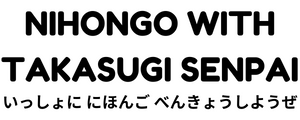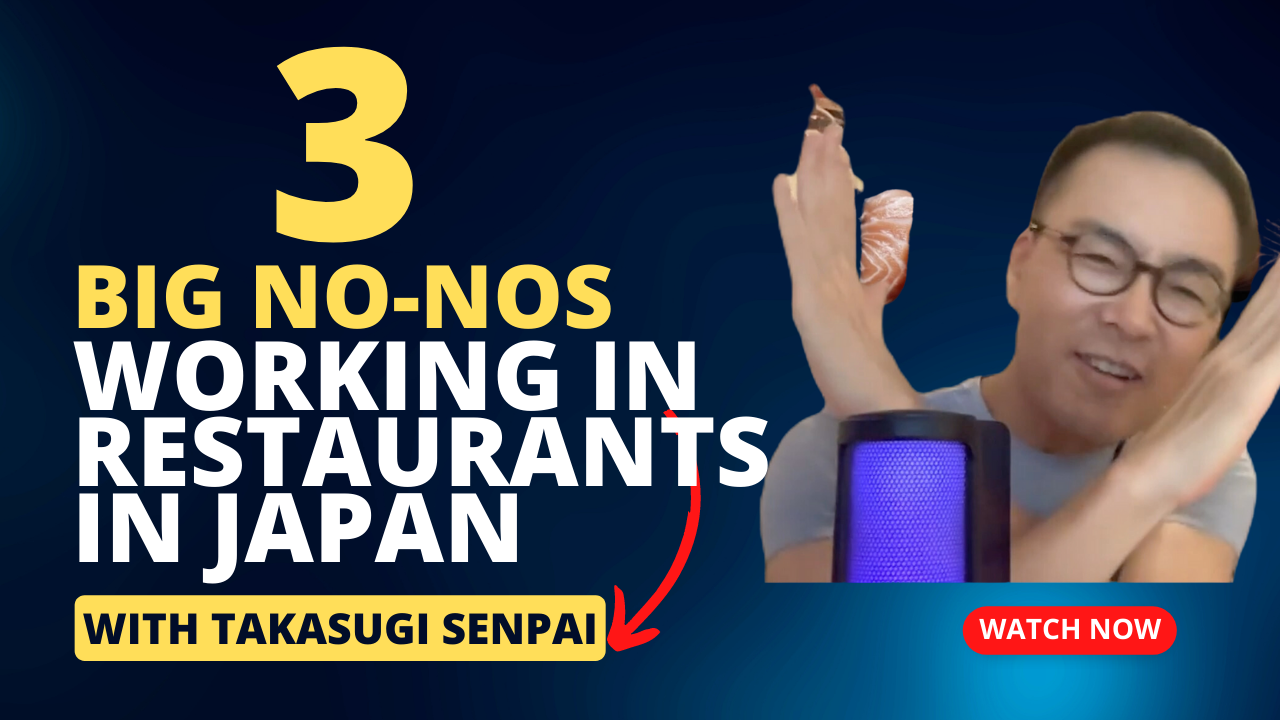In this video, I will talk about three important things you should never do when working in a restaurant in Japan. Working in a restaurant in Japan comes with its own set of cultural expectations, and it’s essential to be aware of these norms to have a successful experience.
Youtube. Watch and Learn by Native Japanese speaking
Subscribe to my Podcast. Listen to Native Japanese Speaking.
Script for the episode
Welcome back to Nihongo with Takasugi senpai!
ようこそ!
さあ今日は日本の飲食店でアルバイトする時の3つのNO!NO!についてお話していきたいと思います。
実はちょっと前に先輩あの某とんかつチェーン店でアルバイトをしておりました。なぜというところなんですけどちょっとね朝方すぎて朝元気すぎてアルバイトしてました。3時間だけ。
ということでまあ1ヶ月で辞めたんですけど、そこにアルバイトをしている外国人の同僚がいました。
co-workerねforeign co-worker
彼と一緒のシフトになることが結構ありまして、そこで私が気づいたというか驚いた行動がいくつかあったので、今日はご紹介したいと思います。
ではまず一つ目
というかこの3つのNo-Noを皆さん聞いていただいて、皆さんももし日本の飲食店でアルバイトするようなことがあったら、ぜひ気をつけていただきたいなと思います。
では行きましょう
一つ目
物を投げるNONO
物を投げる。
まあこれねあの別に大きいものを投げたわけじゃなくて、
皿を投げたとかそういうことじゃないんですけど、あの小さいものふりかけとか seasoningfor riceとか海苔 seaweedとかをお客さんに提供するんですけど、
あの出し忘れた時にこうお客さんのトレイにピョって投げちゃったんですよね。
そしたら投げられたお客さんはもう、何やってんだふざけるなぁな感じで怒っちゃって。はい、まぁちょっとね、あの日本人の感覚だと確かにこう何か物を投げられるっていうのはちょっとあの丁寧じゃない感じがするので、これはもうやめましょう。
はい怒ったおじさんに謝ったのは私です。
全然大丈夫です。
謝りました。で、おじさんもちろん許してくださりましたが、まあこれねあの彼はねなんで怒られたかちょっと最初わかってなかったぐらいなので、ちょっと気づかないというか、もう文化の違いだなあっていう気が私もしました。
けど気をつけましょう。
で二つ目
唾を吐くspit
ダメです。これはダメです。
あの実際にね、あのお店で唾を吐いたわけじゃないんですけど、まぁちょっと暇な時間帯にあの1階のお店だったんですけど、窓があってそこで外を見ながら外に唾を吐いてました。
それを見つけて私が見つけてちょっと言うのね、ちょっとはばかれたんですけど、ダメだよという説明をその時は英語でしたのかな?してましたはい。
これなんでダメかっていうと、あのそこのお店の店員さんが唾を吐いてたよっていうのが通行人の人にばれちゃうと。
これね通行人の人であのいわゆるまぁちょっと言葉選ばずに言うと、めんどくさい人ですねいわゆるめんどくさい人が見つけちゃうとお店にクレームが入ったりしますまあめんどくさい人じゃなくてもちょっとねあの街を綺麗にしようという心がけをしている方は、それを見つけてこうお店にねクレームを入れるということもありますし、もう最悪のケース人にかかってしまうので絶対にダメです。
どうしても唾が吐きたい時はもうアルバイトの時間が終わってからにしてください。もうダメです。誰が見てるかわからないという意識を持つというのが非常に大事かなと思います。
そして3つ目ですねこれはあのノーノーというかぜひ やりましょうということですね。Mandatoryですかね、挨拶グリーティングと笑顔スマーイルこれ非常に大事です。はい、えっとね日本人ってなんかこうね、すれ違ったりして目を合わせなかったりとかなんかこうニコってしたりとかは、もちろんあのしないんですよ。
これはまあ文化的にそういう感じなんですけどことサービス業とかお店の従業員の方っていうのは、逆にそれを求められています。
いわゆる愛想ってやつですかねはいあのなんて言うんだろ、ポライトネスというかフレンフレンドリーネスって感じですかね?
笑顔と挨拶っていうのがないとちょっとあのどうなってんだって思う方は特に年配のお客さんだったら、いらっしゃるかなという感じがします。
最近はねあのそれでも昔ほどじゃないですけど、変わってきてはいますが未だにやっぱり日本のサービス業とかレストランっていうのはいわゆるこのお客様は神様。Customer is Godっていう言葉が日本であるんですけども、その文化があの根底にはあるのかなという感じがしております。
なのでお料理を出すときは「お待たせしました」
お客さんがいらっしゃったら「いらっしゃいませ」
でお客様がお店をでき店を出るときは「ありがとうございました、またお願いします」こういう声がけが非常に大事かなぁと思います。
なので味金最悪いまいちでも すごく愛想がいいとか、あの元気があるお店っていうのは繁盛するのかなぁと思っております。
ということで私が実際の体験を通じて気づいた3つのノーノーですね。いかがでしたでしょうか
皆さんもあの日本に留学して あの語学学校とか通いながらアルバイトしようって考えている方もいると思うんですけど、あの言葉だけじゃなくてね文化の違いでいろいろこうトラブルに巻き込まれるようなこともありうるので、ぜひちょっと気をつけてください 。
あの脅すわけじゃなくてあの非常にあの日本文化ダイレクトに感じることができる。おそらく語学学校では学ぶことができない体験がそのアルバイトを通じてできると思いますし、飲食店は特になんですけど常に人手不足なので、あのアルバイトの採用は比較的されやすいかなと思います。
のでもし興味があったらぜひ日本の飲食店でアルバイトもしてみてはいかがでしょうか。
ということで今日は3のノーノーをちょっとご紹介しました参考になれば嬉しいですいつも likeくれる方ありがとうございますそしてチャンネル登録もお忘れなくそれではまた皆さんお会いしましょう さようなら
English Translation
Welcome back to Nihongo with Takasugi senpai!
Welcome back!
Today I would like to talk about the 3 NOs when working part-time at a restaurant in Japan.
I was actually working part-time at a certain Tonkatsu chain restaurant a while ago. The reason why is because it was too early in the morning and I was too energetic to work there.
So I quit after a month, but I had a foreign colleague who was working there.
A co-worker…foreign co-worker.
There were a few things that I noticed and was surprised by.
Let’s start with the first one.
I would like to share with you three No-Nos that I would like you to pay attention to if you ever have a part-time job in a restaurant in Japan.
Let’s go!
First No. 1
Throwing things NONO
Throwing things.
Well, it’s not that I threw something big,
I didn’t throw a plate or anything like that, but I served small things like furikake (sprinkles), seasoningfor rice, seaweed, etc. to the customers,
When I forgot to serve them, I threw them on the customer’s tray.
The customer who got it got angry and said, “What the hell are you doing? Yes, well, it is not very polite for a Japanese person to have something thrown at him, so let’s not do this anymore.
Yes, I was the one who apologized to the angry man.
It’s totally fine.
I apologized. Of course he forgave me, but he didn’t even understand why he was angry at first, so I felt that he didn’t notice.
I also felt that it was a cultural difference, but let’s be careful.
And the second one
Spitting spit
No, you can’t do that. This is a no-no.
I didn’t actually spit in the store, but it was a store on the first floor, and there was a window, and I was spitting outside while looking out.
I found him and told him that he was spitting outside, and he was a little bit shy, but I explained to him in English that he was not allowed to spit. Yes.
The reason why this was not allowed was that passersby would find out that the shopkeeper had spit on them.
If a passerby finds out that a shopkeeper spits in a store, a so-called “pain in the ass,” to use a word carefully, he or she may file a complaint with the store. If you are not a pain in the ass, but you are trying to clean up the town, you may find it and file a complaint with the store.
If you must spit, please do it after your part-time job is over. It’s a no-no. I think it is very important to be aware that you don’t know who is watching.
The third thing is to say “no-no” or “by all means, let’s do it. Japanese people don’t make eye contact or smile when they pass each other.
This is a cultural thing, but in the service industry and shopkeepers, it is expected of them.
I guess you could call it politeness or friendliness.
I think there are some customers, especially older customers, who wonder what’s going on if they don’t see a smile and a greeting.
Although things have changed recently, I still feel that the Japanese service industry and restaurants are still based on the Japanese saying, “The customer is God. I feel that this culture is at the root of what we do in restaurants.
When we serve food, we say, “Thank you for waiting.
When a customer arrives, we say “Irasshaimase” (welcome).
When the customer leaves the restaurant, I think it is very important to say “Thank you very much.
Therefore, I think that even if the taste is not the best, a restaurant that is very friendly and energetic will be prosperous.
So, these are the three “no-nos” that I have noticed through my own experience. What did you think?
I am sure there are people who are thinking of studying abroad in Japan and working part-time while attending language school, but please be careful, not only because of the language, but also because of cultural differences that can lead to trouble.
I do not mean to threaten you, but you will be able to experience Japanese culture directly. I think you will be able to experience things you cannot learn at a language school through this part-time job, and restaurants in particular are always short of staff, so I think it is relatively easy to get hired.
So, if you are interested, why don’t you try working part-time at a Japanese restaurant?
Thank you very much for your like and please don’t forget to subscribe to our channel.

